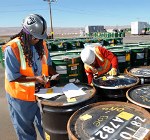
A Little Good News in the Job Sector
Environmental Protection's 2010 Salary Survey results leave the impression that professionals are holding their own in a still-uncertain economy.
- By L.K. Williams, EPonline
- Apr 13, 2011
Here's some good news for environmental professionals: More than 73 percent of the respondents to the 2010 Environmental Protection Salary Survey said they did not see a reduction in salary last year and only 13 percent said they changed employers.

Click image for larger graph on job titles.
The not-so-good news is that respondents reported other reductions. In descending order, the cuts fell in insurance, bonus, salaries, fringe benefits, retirement benefits, and vacation/sick leave. Almost 18 percent of respondents said they lost up to 5 percent of their salaries and nearly 7 percent said their paychecks were smaller by 6-10 percent.
And finally, the bad news is that those who reported benefit cutbacks said that their employers had not been able to restore any of them in the last six months.
After extending the survey deadline, EP captured 505 useable responses to the 2010 survey, a significant drop from 2009 (1,212 responses) and 2008 (1,245 responses).
Salaries for engineers and regulatory compliance specialists seem to be down slightly from 2009 survey responses while consulting salaries were up slightly. Because year-to-year responses vary, comparisons are unavailable for the other top job titles of environmental manager and environmental health and safety manager.
SALARY AVERAGE BY SECTOR AND SCHOOLING
|
|
Manager (84)* |
EH&S Manager (64) |
Engineer (55) |
Consultant (44) |
Compliance Specialist (42) |
|
Manufacturing |
$81,384 |
$101,950** |
$75,178 |
N/A |
$68,944 |
| Government |
$75,602 |
N/A |
$70,968 |
N/A |
$74,571** |
| Consulting |
$67,500** |
$76,500** |
$98,816 |
$92,108 |
$67,000** |
| Bachelor's degree |
$77,429 |
$81,132 |
$74,276 |
$91,000 |
$67,115 |
| Master's degree |
$82,976 |
$87,315 |
$86,340 |
$93,700 |
$74,125** |
| Overall |
$82,680 |
$92,880 |
$85,189 |
$94,500 |
$70,119 |
*Number of respondents
**<10 responses
Overall, respondents (about 60 percent) were "somewhat satisfied" to "very satisfied" with their jobs and their career paths. Given the chance to share why they are satisfied, a few of them focused on employment and the environmental field itself while others may have been working in positions that are not the best fit:
"I have a job," a Yuma, Ariz., government worker responded.
"Great to be working full time again with a benefits package," exclaimed a 60-year-old environmental manager who works in the water/wastewater treatment field from Dayton, Ohio.

Click image for larger graph on work environment.
A respondent from Gainesville, Fla., wrote that his or her satisfaction came from "helping the next generation of environmental engineers learn about the science, techniques, and skills needed to perform their jobs in the future and helping educate this next generation of engineers to replace those of us who will soon be retiring."
"Current focus of the organization on reducing our landfilled materials is providing the opportunity to positively impact both the environment and the bottom line," said an engineer in Rochester, N.Y.
"Working on the safety side. The environmental side is so consuming," said an EH&S manager at a manufacturing facility in Minneapolis. This respondent added that he or she was most dissatisfied with "dealing with the state. They don't try to work with any of the companies pertaining to permits. They just keep you jumping through hoops and then change the rules once you're close."
An environmental manager from Steamboat Springs, Colo., working in the government sector, wrote: "Exposure to different projects and 'hands on' experience which strengthen my resume. More responsibility even though not monetarily compensated." Although this respondent had experienced a 6-10 percent pay cut, he or she chose to look on the brighter side. This manager also expressed "feeling helpless and defeated from lack of public concern or support for environmental protection. It seems as though the majority of career opportunities for environmental specialists [are] in government, which can be trying and lower pay, as it is truly public service."
Others registered complaints about the threat of litigation, the monotony of reporting, and doing 10 jobs in only 40 hours. Some of the more interesting comments about dissatisfaction include the following:

Click image for larger graph on respondent age.
"Asking people to comply with existing regulations to protect water quality and habitat conditions, regulations which in my experience are both necessary and fair, knowing that the regulatory authorities have no funds or staff for enforcement," said a consultant from Berkeley, Calif.
"Dealing with old farts" are the words of a "very satisfied" older engineer working in manufacturing in Englewood, Fla. This person reported a salary of $92,000.
"Working in stormwater tends to be a pigeon-hole career. I have become the 'expert' and therefore I am not considered for other career opportunities for fear of loosing institutional knowledge or lack of variety in my current career choice," said a government regulator in Tallahassee, Fla.
The survey found that among the environmental hot topics that will most impact respondents; the top six were, in descending order:
hazardous waste,
stormwater,
hazardous material,water,
air quality, and
wastewater.
As Congress tries to rein in the Environmental Protection Agency's greenhouse gas initiatives, companies are still trying to do their part for the Earth. According to survey responses, nearly 90 percent recycle, 66 percent minimize waste, 62 percent are trying to be more efficient, and 54 percent are conserving resources and reusing materials.
The 2010 survey is not scientifically valid. It is a compilation of reader responses.
About the Author
L.K. Williams is the Environmental Group Editor of 1105 Media.